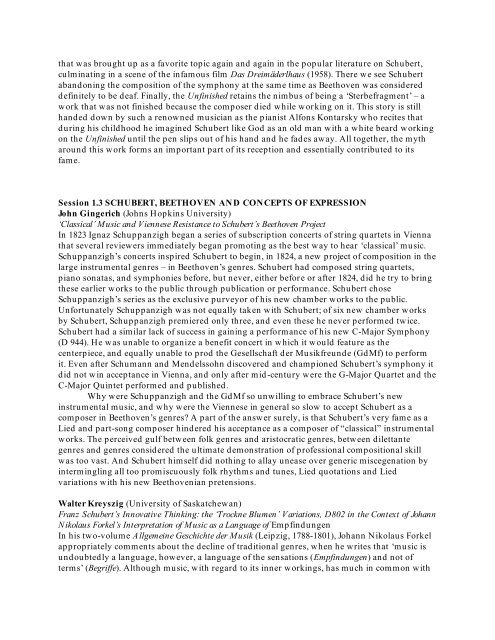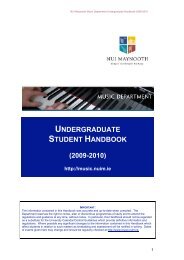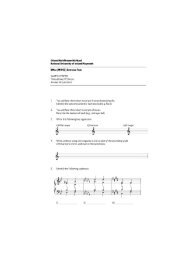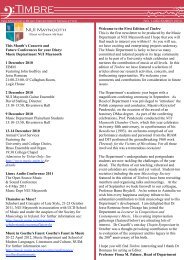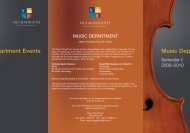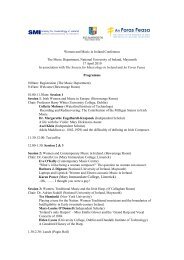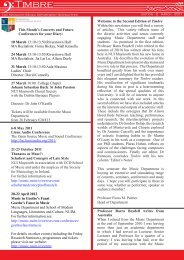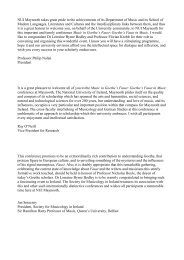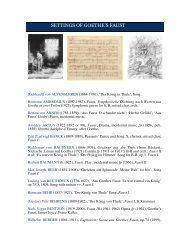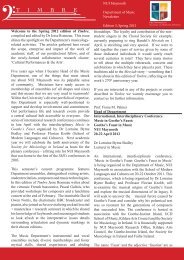Conference Booklet - Music - National University of Ireland, Maynooth
Conference Booklet - Music - National University of Ireland, Maynooth
Conference Booklet - Music - National University of Ireland, Maynooth
Create successful ePaper yourself
Turn your PDF publications into a flip-book with our unique Google optimized e-Paper software.
that was brought up as a favorite topic again and again in the popular literature on Schubert,<br />
culminating in a scene <strong>of</strong> the infamous film Das Dreimäderlhaus (1958). There we see Schubert<br />
abandoning the composition <strong>of</strong> the symphony at the same time as Beethoven was considered<br />
definitely to be deaf. Finally, the Unfinished retains the nimbus <strong>of</strong> being a ‗Sterbefragment‘ – a<br />
work that was not finished because the composer died while working on it. This story is still<br />
handed down by such a renowned musician as the pianist Alfons Kontarsky who recites that<br />
during his childhood he imagined Schubert like God as an old man with a white beard working<br />
on the Unfinished until the pen slips out <strong>of</strong> his hand and he fades away. All together, the myth<br />
around this work forms an important part <strong>of</strong> its reception and essentially contributed to its<br />
fame.<br />
Session 1.3 SCHUBERT, BEETHOVEN AND CONCEPTS OF EXPRESSION<br />
John Gingerich (Johns Hopkins <strong>University</strong>)<br />
‘Classical’ <strong>Music</strong> and Viennese Resistance to Schubert’s Beethoven Project<br />
In 1823 Ignaz Schuppanzigh began a series <strong>of</strong> subscription concerts <strong>of</strong> string quartets in Vienna<br />
that several reviewers immediately began promoting as the best way to hear ‗classical‘ music.<br />
Schuppanzigh‘s concerts inspired Schubert to begin, in 1824, a new project <strong>of</strong> composition in the<br />
large instrumental genres – in Beethoven‘s genres. Schubert had composed string quartets,<br />
piano sonatas, and symphonies before, but never, either before or after 1824, did he try to bring<br />
these earlier works to the public through publication or performance. Schubert chose<br />
Schuppanzigh‘s series as the exclusive purveyor <strong>of</strong> his new chamber works to the public.<br />
Unfortunately Schuppanzigh was not equally taken with Schubert; <strong>of</strong> six new chamber works<br />
by Schubert, Schuppanzigh premiered only three, and even these he never performed twice.<br />
Schubert had a similar lack <strong>of</strong> success in gaining a performance <strong>of</strong> his new C-Major Symphony<br />
(D 944). He was unable to organize a benefit concert in which it would feature as the<br />
centerpiece, and equally unable to prod the Gesellschaft der Musikfreunde (GdMf) to perform<br />
it. Even after Schumann and Mendelssohn discovered and championed Schubert‘s symphony it<br />
did not win acceptance in Vienna, and only after mid -century were the G-Major Quartet and the<br />
C-Major Quintet performed and published.<br />
Why were Schuppanzigh and the GdMf so unwilling to embrace Schubert‘s new<br />
instrumental music, and why were the Viennese in general so slow to accept Schubert as a<br />
composer in Beethoven‘s genres? A part <strong>of</strong> the answer surely, is that Schubert‘s very fame as a<br />
Lied and part-song composer hindered his acceptance as a composer <strong>of</strong> ―classical‖ instrumental<br />
works. The perceived gulf between folk genres and aristocratic genres, between dilettante<br />
genres and genres considered the ultimate demonstration <strong>of</strong> pr<strong>of</strong>essional compositional skill<br />
was too vast. And Schubert himself did nothing to allay unease over generic miscegenation by<br />
intermingling all too promiscuously folk rhythms and tunes, Lied quotations and Lied<br />
variations with his new Beethovenian pretensions.<br />
Walter Kreyszig (<strong>University</strong> <strong>of</strong> Saskatchewan)<br />
Franz Schubert’s Innovative Thinking: the ‘Trockne Blumen’ Variations, D802 in the Context <strong>of</strong> Johann<br />
Nikolaus Forkel’s Interpretation <strong>of</strong> <strong>Music</strong> as a Language <strong>of</strong> Empfindungen<br />
In his two-volume Allgemeine Geschichte der Musik (Leipzig, 1788-1801), Johann Nikolaus Forkel<br />
appropriately comments about the decline <strong>of</strong> traditional genres, when he writes that ‗music is<br />
undoubtedly a language, however, a language <strong>of</strong> the sensations (Empfindungen) and not <strong>of</strong><br />
terms‘ (Begriffe). Although music, with regard to its inner workings, has much in common with


